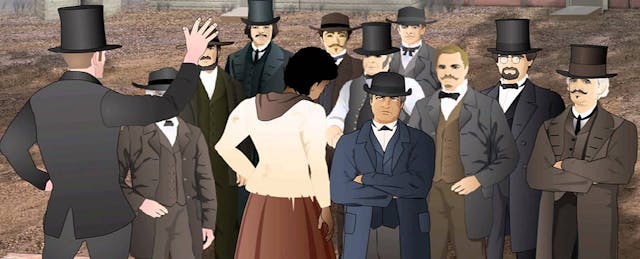EDITOR'S NOTE: In the EdSurge article "Is a Slave Simulation Game Appropriate for Classrooms?", author Rafranz Davis expresses frustrations over Mission US: Flight to Freedom, a role playing game in which users step into the character of a 14-year-old slave as she attempts to escape slavery. In response to Davis's article and sentiments that teaching slavery in a role playing game is not appropriate, the game's producer WNET Education responds below.
Much time and care was taken to create Flight to Freedom. It was developed by a team of historians at the American Social History Project/Center for Media & Learning (ASHP), a research center at the City University of New York Graduate Center. ASHP worked in collaboration with African American scholars who are experts in the history of the period -- Nikki Taylor, at the time historian at the University of Cincinnati and the National Underground Railroad Freedom Center (now chair and professor of history at Texas Southern University) and Christopher Moore, at the time a public historian and researcher at the Schomburg Center for Research in Black Culture at the New York Public Library. Ira Berlin, one of the foremost historians of slavery and Distinguished Professor at the University of Maryland, also served as an adviser.
Flight to Freedom is part of a growing body of "serious games" that immerses users in historical and contemporary problems in ways that encourage perspective-taking, discussion, and weighing of multiple kinds of evidence. Educators have found that games can be an effective way to teach about sensitive topics such as human rights, the war on terror, immigration, and environmental crises. The Mission US approach has been shown to be especially effective for reaching struggling learners who have difficulty learning from a textbook.
The development of Flight to Freedom drew upon forty years of scholarship by our nation's most pre-eminent historians of slavery, including the late John Hope Franklin, whose research and writing has helped generations of Americans -- of all racial and cultural backgrounds -- confront the most brutal chapters of our nation's history with truth, courage, and dignity. Informed by the latest scholarship, Flight to Freedom helps students understand how enslaved people -- like the main character -- helped to liberate themselves and then worked to free others.
In small formative studies of Flight to Freedom with diverse middle school students, Education Development Center researchers found that youngsters were surprised by the arbitrary cruelties of the slave system, and deeply interested in the different ways that slaves could and did resist it. Whatever students' background, game events helped widen their view of how slavery worked, and the ways that enslaved and free people struggled against it. As intended, the game served as a springboard for questions, discussion, and further learning via the curriculum materials. Mission US has a large and growing number of users—close to one million—from across the country.
No history book covers all the ills of slavery; Flight to Freedom is no different. Although geared to children, the mission tells some ugly truths about slavery, including the work regimen of enslaved people, the inhumanity of bondage, the cruelty of abuse, the destruction to families, the physical consequence of disobedience, the impact of the psychological damage. But the mission also aims to humanize enslaved people and present them with dignity, courage, fear, and real human emotions like love and hate. The mission portrays enslaved African Americans with agency and personal power (even when social, economic, and political power was non-existent), and as central actors in their own destinies. Our goal is for all students to develop a greater respect for African Americans' struggle and African American history as a part of American history. Although we regret to hear that some people have found the game to be problematic, we stand by it.


